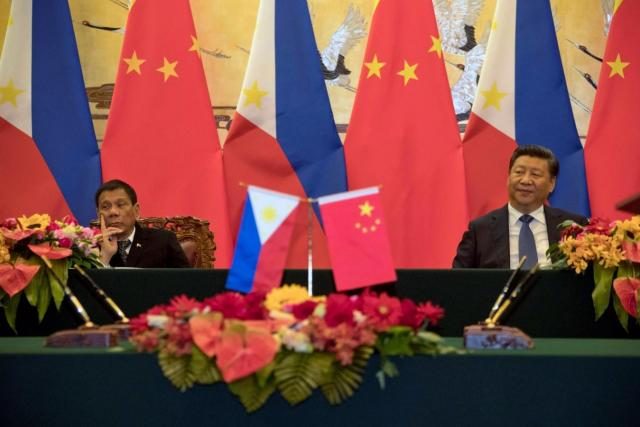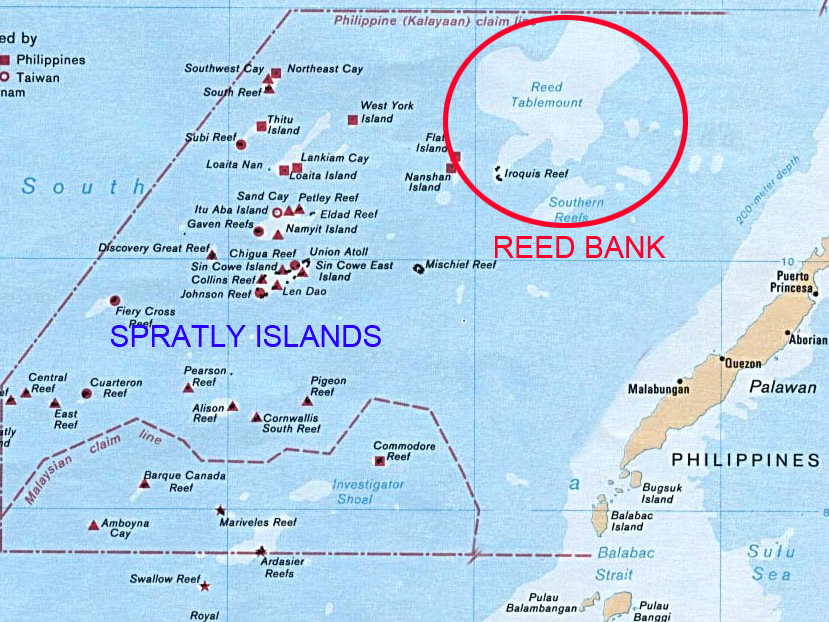
President Rodrigo Duterte (L) and Chinese President Xi Jinping attend a signing ceremony held in Beijing, China, October 20, 2016. REUTERS/Ng Han Guan
Supreme Court Senior Justice Antonio T. Carpio on Saturday pointed out that the United Nations Charter outlaws the use or threat of force to settle disputes between states.
This was in relation to news reports Friday attributing to President Rodrigo Duterte a threat of war emanating from Chinese President Xi Jinping.
Duterte said he discussed with Xi an award last year by the United Nations Permanent Court of Arbitration in The Hague, which ruled largely in favor of the Philippines when the two met in Beijing on Monday.
The Hague award clarified Philippine sovereign rights in its 200-mile Exclusive Economic Zone to access offshore oil and gas fields, including the Reed Bank, 85 nautical miles off its coast. It also invalidated China’s nine-dash line claim on its maps denoting sovereignty over most of the South China Sea.
“We intend to drill oil there, if it’s yours, well, that’s your view, but my view is, I can drill the oil, if there is some inside the bowels of the earth, because it is ours,” Duterte recalled his conversation with Xi.
“His response to me,” said Duterte, was “‘we’re friends, we don’t want to quarrel with you, we want to maintain the presence of warm relationship, but if you force the issue, we’ll go to war.”
- ‘China’s threat of war reveals the aggressive design of China against the Philippines, delivered personally no less by Chinese President Xi Jinping to President Duterte. This extremely troubling development calls for all Filipinos to unite to defend the West Philippine Sea in accordance with the Constitution, international law and UNCLOS.’ – Senior Justice Antonio T. Carpio
Carpio underscored that the arbitral tribunal created under the United Nations Convention on the Law of the Sea (UNCLOS), to which China is a party, ruled with finality that the Reed Bank is within the Exclusive Economic Zone (EEZ) of the Philippines and only the Philippines can exploit the natural resources within Philippine EEZ.
Might trumps right?
For his part, former Foreign Affairs secretary Albert del Rosario said China’s threat “demonstrates to the world its position regarding the arbitral tribunal outcome that is consistent with UNCLOS.
“China has declared unequivocally that right is not might. That instead it is might that trumps what is right.
“And finally, that China – unless it is in a position to benefit – does not intend to respect the rule of law.”
Gross violation of UN charter, UNCLOS, treaties
“The threat of China to go to war against the Philippines if the Philippines extracts oil and gas in the Reed Bank, or in any area within Philippine EEZ in the West Philippine Sea, is a gross violation of the United Nations Charter, UNCLOS, and the Treaty of Amity and Cooperation in Southeast Asia to which China and the Philippines are parties,” Carpio said in a statement.
“The threat of China to go to war against the Philippines if the Philippines extracts oil and gas in the Reed Bank, or in any area within Philippine EEZ in the West Philippine Sea, is a gross violation of the United Nations Charter, UNCLOS, and the Treaty of Amity and Cooperation in Southeast Asia to which China and the Philippines are parties,” Carpio said in a statement.
“As a nation that under its Constitution has renounced war as an instrument of national policy, the Philippines’ recourse is to bring China’s threat of war to another UNCLOS arbitral tribunal, to secure an order directing China to comply with the ruling of the UNCLOS arbitral tribunal that declared the Reed Bank part of Philippine EEZ.

Map shows Reed Bank cluster near the Sppratly Islands.
Sue for damages
“The Philippines can also ask for damages for every day of delay that the Philippines is prevented by China from exploiting Philippine EEZ.”
Justice Carpio said the Philippines can also bring China’s threat of war before the United Nations General Assembly “by sponsoring a resolution condemning China’s threat of war against the Philippines and demanding that China comply with the ruling of the UNCLOS arbitral tribunal. China has no veto in the General Assembly.”
Because the Philippine Constitution mandates that the “State shall protect the nation’s marine wealth in its xxx exclusive economic zone” and since the Philippines has renounced war as an instrument of national policy, Carpio said, “the President has the constitutional duty to use all legal means under international law to protect Philippine EEZ.
‘President cannot simply do nothing’
“In the face of China’s open threat of war to seize Philippine EEZ in the West Philippine Sea, an area larger than the total land area of the Philippines, the President cannot simply do nothing, or, worse, acquiesce to China’s action, for inaction is the opposite of protecting Philippine EEZ.”
Under international law, Carpio explained, “acquiescence is the inaction of a state in the face of threat to its rights under circumstances calling for objection to the threat to its rights. Acquiescence means the Philippines will lose forever its EEZ in the West Philippine Sea to China.”
China’s “blatant threat of war” against the Philippines demands that the Philippines strengthens its defenses and alliances, he added.
“In particular, the Philippines must strengthen its alliance with the United States, the only country with whom the Philippines has a mutual defense treaty. The United Nations Charter recognizes the right of states to mutual self-defense against armed aggression. The Philippines can ally with the United States because the United States does not claim the West Philippine Sea or any Philippine territory. The Philippines cannot ally with China because China wants to grab for itself the West Philippine Sea and the Spratlys. As long as China threatens the Philippines with war over the West Philippine Sea, the Philippines can never lower its guard in its dealings with China.
Only China
“Among all the countries in the world, only China has threatened the Philippines with war over Philippine EEZ in the West Philippines Sea. The other claimant states in the Spratlys – Vietnam, Malaysia, Brunei – recognize Philippine EEZ, including Reed Bank, in the West Philippine Sea. The only dispute of the Philippines with Vietnam and Malaysia is on high-tide elevation rocks and their 12 nautical mile territorial seas in the Spratlys, which are more than 100 nautical miles from Reed Bank. Vietnam and Malaysia are certainly not claiming the Reed Bank. The Philippines has no dispute with Brunei.
“Reed Bank is vital to Philippine national interest. It is the only replacement for Malampaya, which supplies 40 percent of the energy requirement of Luzon. Malampaya will run out of gas in less than 10 years. Unless the Philippines develops Reed Bank, Luzon will suffer 10 to 12 hours of brownouts daily 10 years from now. This will devastate the Philippine economy.
“China’s threat of war against the Philippines over the West Philippine Sea reveals the aggressive design of China against the Philippines. No less than Chinese President Xi Jinping has delivered the threat personally to Philippine President Rodrigo Duterte. This extremely troubling development calls for all Filipinos to unite to defend the West Philippine Sea in accordance with the Constitution, international law and UNCLOS.”
http://www.interaksyon.com/whiff-of-war-justice-carpio-bring-chinas-threat-to-united-nations/

No comments:
Post a Comment
Note: Only a member of this blog may post a comment.